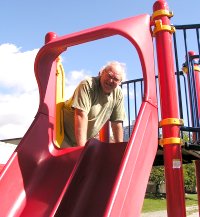Depression, the Silent Invader

Major depression is a disabling condition which adversely effects a person's family, work or school life, sleeping and eating habits, and general health.
Depression and the diagnosis of it is a complicated process. There are so many variables. For my purpose, I will use the one theory that states that biological, psychological, and social factors all play a role to varying degrees in causing depression. Depression results when a preexisting vulnerability is activated by stressful life events. This susceptibility can be either genetic or from views of the world learned in childhood.
This is where self-esteem comes back to the forefront. How we feel about ourselves effects our health dramatically. When we grow up in an environment that is not nurturing to us, our self-esteem suffers and depending on the severity of our early learnings, our health will suffer to that degree.
Normalcy of Depression
Our culture looks down on fear as despicable and depression as if it were a violation of our 'pursuit of happiness'. Even some schools of the psychological establishment strips depression of its status as a legitimate emotion. They dismiss it as a result of negative thinking or the repression of sadness and anger. We must learn to tell the difference between depressed thinking, which can be eliminated easily and depressed feelings. Occasional feelings of energy loss and despondency are a normal part of life. When it becomes the norm, it needs to be addressed.
Depression is sometimes a wake-up call for the need to slow down, recharge and reevaluate our life and it's activities. At such a time we can unfold into our deepest intuitiveness. One recurring gift that typically shows up in depression is the need to make changes in our life. This may constitute relinquishing a relationship or job that is no longer working for us.
What are the symptoms of depression?
* feeling worthless, helpless or hopeless.
* disruptive sleeping habits either more or less
* eating more or less than usual
* difficulty with making decisions and with concentrating
* Losing interest in the things that used to be important
* 'Caving'(avoiding people)
* Loss of sex drive
* feeling overwhelmed, sad or grief stricken
* feeling excessively guilty
* lack of energy and feeling tired
* thoughts of suicide and death
Antidepressants are considered the cure, but since all medications are poison to our systems, we need to get to the source of it as soon as possible. This would be a good time to find someone to talk to about your condition. There are many good counselors that are trained to listen and spot areas in your belief system that do not contribute to your emotional health.
A look at depression from an observer
The symptoms of depression spoke about previously on this page are for the depressed person to notice about themselves. But from an outsiders point of view, there are little tell-tale signs that are not noticed on a normal day.
1. the plants are dying
2. the garbage is overflowing
3. the house is unkept, dishes are not done and laundry is piled high.
4. the little extra things that most people take care of because 'things work better that way' are not taken care of.
For instance, bills are not paid on time, the cupboards are not stocked, the tires on the car are low, the car is dirty, the lawn is overgrown, the dryer is not working properly or there is a leak in the bathroom that has been there for quite some time.
All of these signs and more show that life has lost it's joy in this household. If you are close to this person, please ask them to talk to you about it. They are not lazy but sad and unmotivated.
Exercise is considered to be one of the most important activities for people with depression. As a fitness instructor, I have many accounts of women curing their depression with regular exercise. Of course, I understand that it takes motivation and discipline to exercise regularly, so it can be a bit of a catch 22.
We really do need to be aware of our depression. Our friends and our family need to help us to realize what is happening and to support us to make changes. We need to reach out for help.
Good nutrition is also important to keep the brain healthy. Avoid sugar and processed foods, alcohol and caffeine. Eat good quality protein including lean meat, game, fish, eggs and seafood. Sources of good vegetable protein are seeds, nuts, whole grains and legumes like soya and kidney beans. Protein is extremely important in providing amino acids that build neurotransmitters in the brain which in turn are responsible for mood regulation.
Don't forget fresh fruits and vegetables. They are important for fiber, vitamins and minerals.

What do you like to do?
If there is something in your life that excites you;something that you have been good at in the past, I suggest that you do it, if you feel depressed and despondent. Being inspired can break the spell of depression. Being busy can fill in the time that we would normally use to feel sorry for ourselves. Helping others has also been proven to take us out of ourselves and give us a higher purpose.

"Love Yourself Enough to Do What it Takes to Create a Life of Joy and Happiness"--Janet Robinson
For a great website that explains more about depression, the symptoms and effects it has on other aspects of our lives, as well as natural remedies, click here...
Return from Depression to Healthy Mind
Return from Depression to Self-Growth






